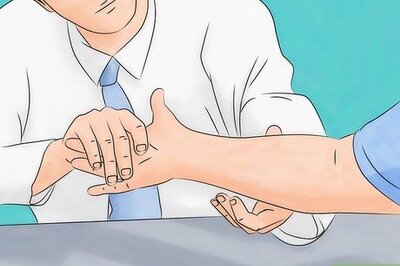
views
People usually don’t pay enough attention to their feet, compared to other parts of their body. Our feet can reveal a lot about our overall health. From swelling to numbness, our feet can indicate a variety of health conditions that require attention. Paying attention to these symptoms, identifying underlying conditions and treating them early is crucial to improving our overall well-being. Let’s take a look.
Swelling of the feet: Swelling in the feet can occur primarily due to standing for long periods. Frequent leg swelling, called oedema, can be a sign of high blood pressure, kidney, liver or heart disease. Swelling occurs when excess fluid is stored in the body’s tissues. This can be the result of poor circulation or fluid retention. Elevate your legs as often as possible to naturally reduce swelling, drink plenty of water, reduce salt intake and wear compression stockings to improve circulation.
Spider veins: Small, twisted blood vessels under the skin are often caused by high levels of estrogen. Nerves can appear due to pregnancy, taking birth control pills, or hormonal imbalance. This is especially true in the legs. Although this is harmless in most cases, it can cause discomfort. Daily exercise and a healthy weight can help improve circulation and reduce spider veins. If this makes you feel uncomfortable, you should see a doctor.
Cracked heels: Cracked heels on the feet are caused by dry feet. We should not just consider this a cosmetic defect, but also find out the cause behind it. This indicates a vitamin B2 deficiency. This vitamin is especially important for maintaining healthy skin. A deficiency in this vitamin can lead to dry, cracked skin. To remedy this, you should include eggs, meat, and green vegetables rich in vitamin B2 in your daily diet. Applying moisturisers, especially those containing urea or lactic acid, can help with cracked heels.
Tingling and numbness in the legs: An early symptom of vitamin B12 deficiency. This vitamin can support nerve function. A deficiency can lead to nerve damage and numbness in the legs. Eat foods rich in B12 such as meat, dairy products and eggs to compensate for this vitamin deficiency.
Cold feet: When other parts of our body are cold, most of the time it is only the feet that are cold due to the cold environment. But it can also be an indication of iodine deficiency or anaemia. Both of these affect our body’s ability to regulate body temperature. Iodine is important for the functioning of the thyroid gland. A lack of iodine slows down the metabolism and causes cold feet.
At the same time, iron deficiency anaemia leads to a reduced oxygen-carrying capacity of the blood and cold hands and feet. Make sure you get enough iodine in your diet to counteract this naturally.
You can avoid iodine deficiency by including dairy products in your daily diet and using iodized salt. At the same time, eat foods like spinach, red meat and beans to compensate for iron deficiency. Wear socks to insulate your feet.


















Comments
0 comment